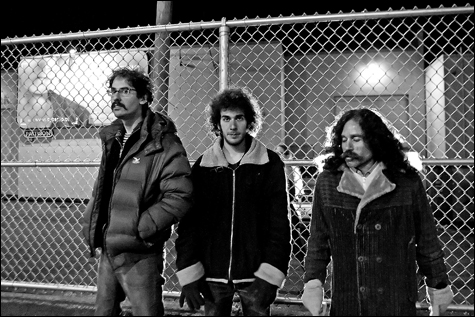
UNDER THE WALL: Drag City will release the Tel Aviv punk band Monotonix’s debut EP next month.
|
It’s Tuesday night at the Abbey Lounge in Inman Square, and the Israeli band the Genders are having some problems. The crowd have spent more time looking at their beers than at the stage, and the smatterings of applause are perfunctory at best. Yet as the Genders launch into their next number, some faces in the crowd light up: “Born in Brooklyn in the USA/They called me Jewfro Jerome/I changed my name/Got on a plane/Found a place to call home/I ride a tank in the West Bank/I’ll never leave/Who needs Tel Aviv!!!”
People applaud, and a couple near the stage begin to dance, enjoying the jumping beat and the singer’s high spirits. But as the song continues, its sentiments begin to sound mocking rather than joyous. “Look out mamma, my name is Horatio/I perform cunnilingus in return for fellatio.”
“Yeah!” someone in the audience screams, a guy with . . . well, a Jewfro. Maybe he doesn’t realize that the song is a putdown of a specific type of Israeli immigrant — the American transplants who populate the occupied territories in the West Bank. It portrays them as losers who can’t function in their own country and so move to the settlements to swagger like cowboys and — in the opinion of many Israelis — sow the seeds of further conflict.
The sound of angry Israeli youth mocking the extreme right is growing in volume, so much so that it’s now reaching the US. Next month, hip US indie label Drag City will release the EP Body Language, the first conventionally produced and distributed album by the Tel Aviv punk band Monotonix. And Useless ID (signed to the US label Kung Fu) have toured widely in the US. Their last trip to Boston was in 2003, when they played Axis.
But the real point here is the degree to which punk has taken hold in Israel itself. Although Israeli punk’s legacy can be traced to Rami Fortis’s 1978 release Plonter (loosely translated as “fucked up”), it’s only during the past couple of years that punk has really caught on. “Punk bands are suddenly more numerous than ever,” says Ayelet Yagil, former editor-in-chief of Israel’s rock Web site, mooma.com. “They have their own clubs, not only in Tel Aviv and Haifa but even in Jerusalem.”
Tal Aviv and Haifa are cosmopolitan centers; religiously dominated Jerusalem is another matter, and the presence of punk clubs there is significant. As Yagil explains over the phone from Tel Aviv, “This used to be a nice little socialist country with progressive ideals. Now it’s more and more like the States — and the occupation is destroying its soul.”
Some bands, like Nikmat Olalim (“Toddler’s Revenge”), dodge military service as they create what they call “anti-Zionist punk.” (“Our ancestors sowed the seeds of oppression/Now it’s time to burn their crops!” they shout in “Your Culture Makes Me Sick,” from the 2003 album Battle Legacy.) Others, like Useless ID, go international with their message, contributing to anti-war compilations like 2004’s Rock Against Bush, Volume 2 (Fat Wreck Chords). Man Alive are outspoken pacifists; a tiny number, among them Retribution, are reactionary militarists. As Retribution sing in their self-released homonymous single, “The flag of our nation is burning to dust/Our streets are painted red. . . . The sky is getting greyer with powder dust/Don’t interfere if you don’t spill your own blood.”
What these bands share is their concern about Israel’s relations with the Palestinians and, more essentially, its identity as a Jewish state. The frustration and the confusion that dominate their lives also drive their music, producing intense, energized, sometimes manic songs and performances.
Speaking about Israel, Jewish-American documentary filmmaker Liz Nord told me, “It’s a very macho culture in some ways, mostly because it’s always had to be.” Nord, who lives in New York, recently completed a documentary about Israeli punk,
Jericho’s Echo
. “Every man and woman is trained to be able to fight if there is a war. Israelis are completely surrounded by enemy nations, and everyone knows they will be called upon if the worst happens. That’s why people are so disturbed by the punks. They pose a threat to the traditional way of doing things. They’re dropping out of the overall society because they’re disillusioned with it. And they’re taking a stand by in some sense embracing passivity.”
This passivity is perhaps most visible in a growing movement that seems like a throwback to an earlier era in the West. Throughout Tel Aviv, Israeli youth are fighting the occupation by taking over un-occupied buildings on their own side of the “security fence.” They’re in effect bringing the settlements to the home front.